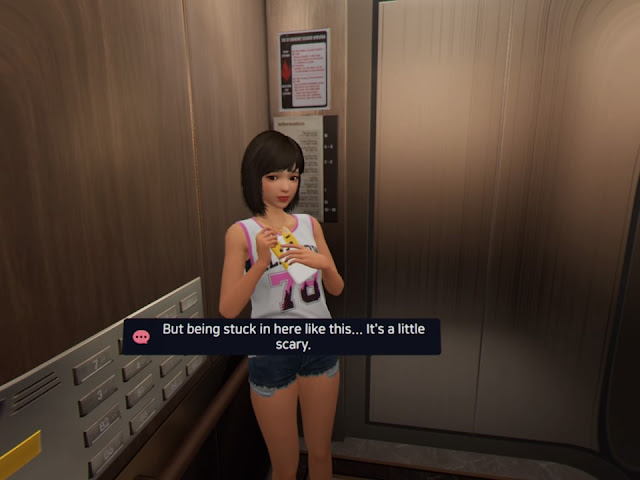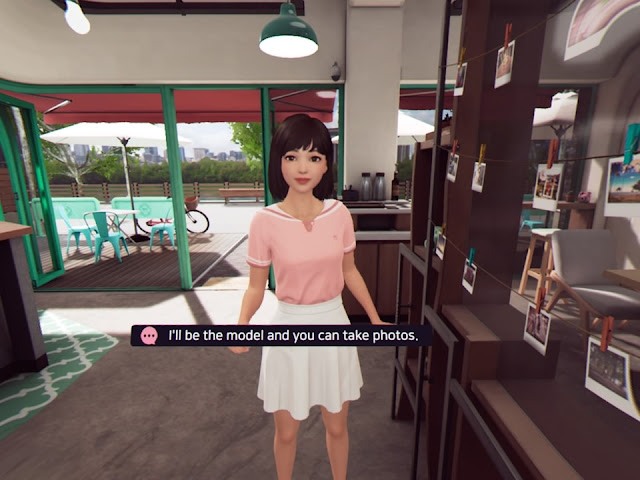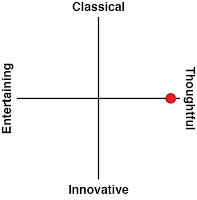Review by Matt S.
Most of us feel some kind of nostalgia for our youth and time at high school. Particularly the romantic side of our coming of age experience. The first crush. The first girlfriend. The consistently awkward, embarrassing, overly sentimental efforts at romance as we try to emulate those films that told us that this is how romance is meant to work. Of course actual romance doesn’t actually work that way, and by the time we hit out twenties we all have a far more balanced view of the world. And yet the nostalgia for the moments of innocence remains. That’s what Focus on You captures. And it does a remarkably good job of it, too,
Focus on You is a story of two teenagers; a boy, who works at a cafe and enjoys taking photos, and a girl, who aspires to be a fashion designer and needs someone to take photos of her modelling her clothes. Across eight chapters, each one scene long, the game relates the deepening relation between the two, which starts as an awkward friendship, because taking a turn to the flirtatious and finally ending up with the big “look at me in my bikini” moment and inevitable confession. And then it stops. Almost before it’s started, Focus on You is over.
I’d argue that the game’s length is absolutely necessary to its thematic strength. Nostalgia has a habit of simmering down so that we only remember the briefest, most pleasant snapshots. It’s an actual, observable psychological function, as Frank T. Andrew notes: “Cognitive psychologists have identified a phenomenon they refer to as the Pollyanna Principle. In a nutshell, it means that we process, rehearse, and remember pleasant information from the past more than unpleasant information. (An exception to this pattern would be depressed individuals who continually ruminate upon past failures and disappointments.) For most of us, the reason that the good old days seem so good is that we focus on the pleasant stuff and tend to forget the day-to-day unpleasantness.
“These innocent forms of self-deception enable us to keep striving. If our past was good and our future can be even better, then we can work our way out of the unpleasant, or at least mundane, present.”
Focus on You is very much cut from this mold. The only memories being shared are the critically happy ones. There are no moments of tension between you – playing as the boy – and the girl through any of the eight chapters. Where something “bad” does happen, it’s only in the context of a pleasant memory. A lift breaks down when you’re both on it, and the girl’s terrified, but you hold hands and she feels better. There’s a sad moment at the end, but it’s framed in bittersweet terms, and immediately after there’s a short scene to reassure us that the relationship between the two survives. Everything about this game is shrouded in a warm, fuzzy nostalgia, and it’s so utterly mundane that it’s easy to take the VR goggles off and be reminded of your own experiences at high school.
Why would the developers want to reach back into memories of high school then? Particularly when to do so means you end up depicting a teenage girl in a romantic light – something that in the context of video games the way they are now, would mean that your game could be targeted with robust, knee-jerk criticism? The developers have insulated themselves from that to an extent by choosing to release the game exclusively in Japan and Asian markets, so the only people in the west that are likely to discover the game are those who would be predisposed to actively want to play it (though other games have tried this trick and failed to avoid the articles anyway), but nonetheless why go with this story over some floundering sentimental fling that occurs in the 20’s or 30’s? Most – if not all of us – have had those as well, after all.
Psychology to the rescue here with an answer, too: these particular memories of school are the more powerful and formative ones to our very sense of being. There are reasons that we have a particular predisposition to remember our time at school with particular vividness, as Andrew also notes, this time in the Washington Post: “What is it about this time of life that makes it stand out from the rest of our years? Part of it is undoubtedly due to changes in the brain’s sensitivity to certain types of information during adolescence. Emotions signal the brain that important events are happening, and the teen years are chock-full of important social feedback about one’s skills, attractiveness, status and desirability as a mate. This is precisely the stuff we need to pay attention to in order to successfully play the cards we have been dealt and to become socially and reproductively successful.”
So, there you go. Focus on You might surprise as a sharp and quite honest take on a nostalgic phenomenon that we’re all psychologically hard-wired to indulge. As a game, it doesn’t do much and is, in effect, a visual novel. You’ll be able to choose from a couple of different options for responding to the girl as she chatters away with you. There are only a couple of moments of interactivity, such as when you go diving to look for a lost bracelet that the girl considers to be precious, or you play around with your phone to message a friend, and there’s no way to “fail” at those. It’s a purely linear experience.
Cleverly, though, the main “gameplay” feature is the camera – the very same tool that is explicitly designed to capture memories and preserve nostalgia for years, if not generations, thereafter. In most scenes you’ll get a chance to take a couple of photos of the girl. In one scene she’s practicing her modelling poses, the next modelling for real, and then you’re taking candids of her during an underwater dip that you take together. These photos are saved to an album, and you’re able to “print” them out to fill photo frames in your room, or even stick them on virtual postcards to export to real world social media. That’s where the screenshots in this review have come from. It makes a great deal of sense that the core gameplay loop within Focus on You would be one built around nostalgia.
It’s the small details that really help to sell what the game wants to offer. The exaggerated awkwardness as the blushing girl heads down the wrong hallway in the hotel after holding hands for the first presents her as the idealised first romance that your memory has stored. The extra-bouncy physics of her skirt when she jumps in excitement never goes so far that you’ll see something, but is certainly the kind of exaggeration that you’d expect from the way memories become hazy and hyper-real through the lens of nostalgia. Her facial expressions, or the way that she puts a flower into her hair is just too postcard-perfect. Truly one of the more impressive applications of VR is in the way it is able to render humans in a far more life-like manner than typical games can, by introducing them to the perception of a physical space, and Focus on You has taken this and built the fantastic hyper-real over the top of it, to drive home a realistically romanticised memory of the world.
The only person you’ll ever see in Focus on You is this perfect girl, and this is yet another clever way that the development team have been able to depict the idea of a nostalgic memory. Because of course within the flashing memories of those high school romances there is only you and the other, with everything else – and everyone else – blanked out completely. There are no other people in the cafe. No one else is enjoying the beach when you and her are there. There are no other class-mates on the school trip. Somehow this is all completely believable precisely because of the specific lens through which it is all being presented, and that just goes to show how strong the narrative and design is at carrying this theme. Even in fellow “this is a human being” simulator, Summer Lesson, I often felt that it was odd that there was no one else at the shrines or cafes that you might visit.
Despite the reputation that the game will no doubt get within some certain circles, Focus on You is absolutely not sexualised on any level. Yes, the girl wears a bikini in some of the scenes, but given that you’re at the beach and there’s no specific effort to draw your attention to her body (in fact she’s so busy talking that you’re meant to stay completely focused on her face), there’s no more sexualisation there than there is in a trip down to your typical pool or beach in the real world. (Side note, but seriously, this idea that bikinis are inherently sexual needs to die). Elsewhere there is some flirtation that goes on, but it’s sweet young romance, rather than smutty innuendo. Really, Focus on You is an incredibly sweet little game and story, rather than a Lolita simulator. It’s told charmingly, and if you read anything more into it than that, then the issue’s really with you, rather than the game.
Like a wave of nostalgia, Focus on You is over fleetingly quickly, and it’s not exactly a deep and meaningful experience. It is beautifully produced and performed, however, and an excellent use of the unique experiences that VR enables. It’s not going to win game of the year awards, but nostalgia is a tricky beast for developers to work effectively with, and I think this one captures the aesthetic and tone of a nostalgic memory perfectly.
– Matt S.
Editor-in-Chief
Find me on Twitter: @digitallydownld









